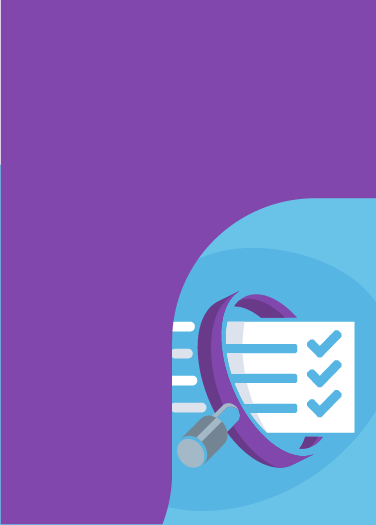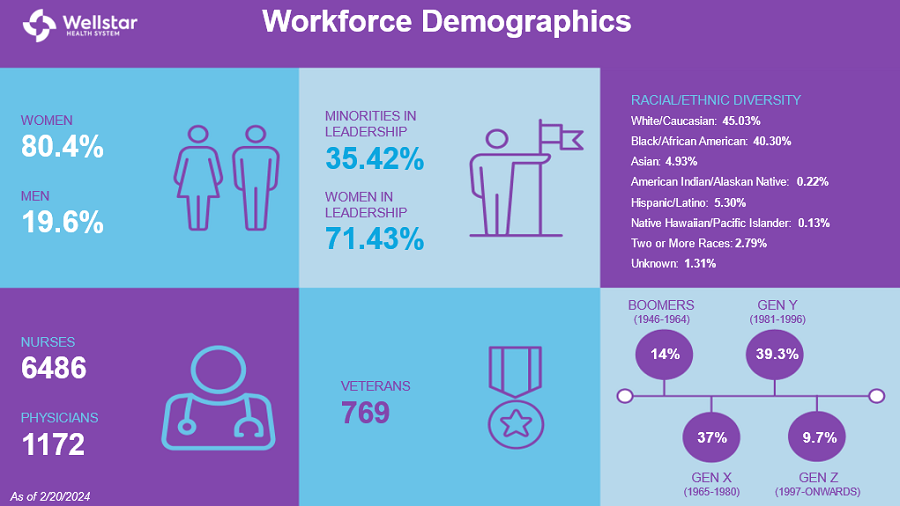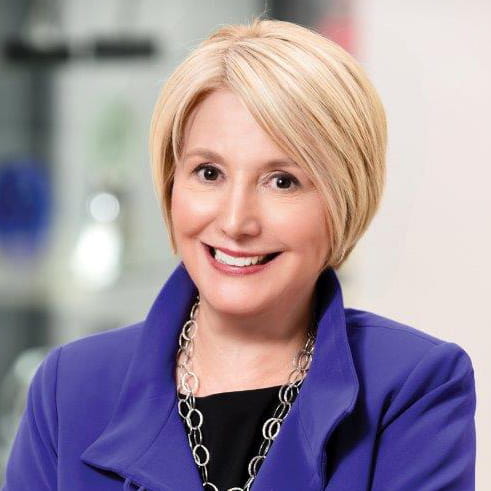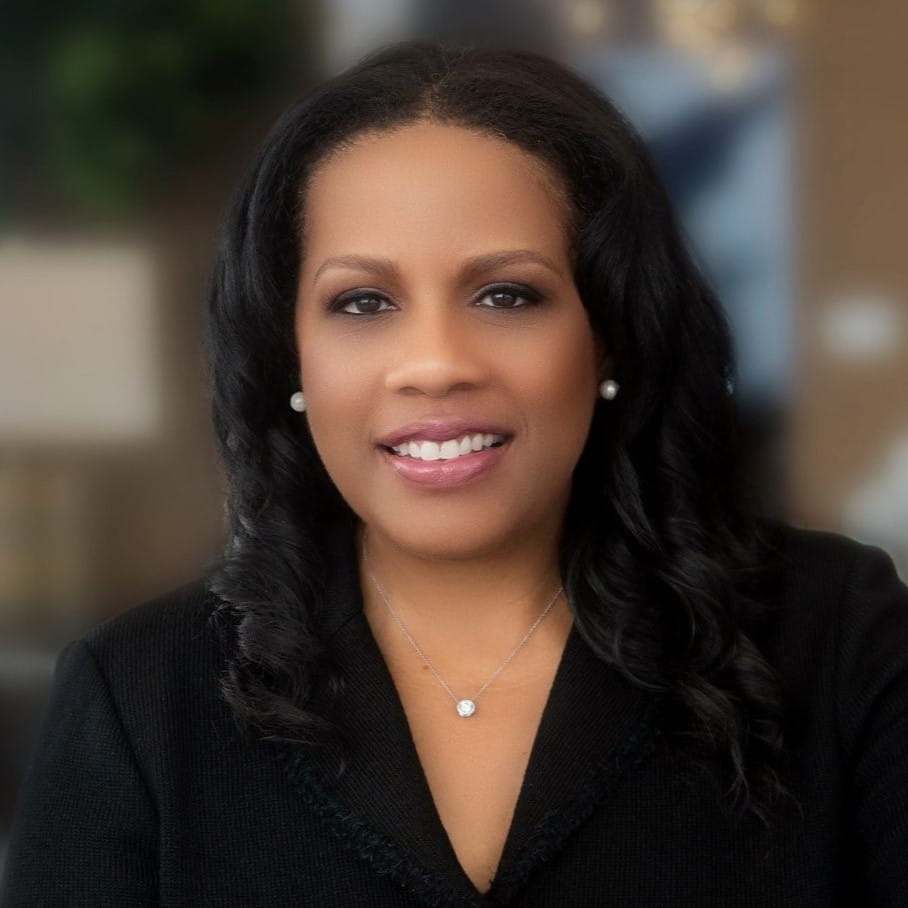
AMC Facts
- Letter to the Community
- Commitment to Diversity
- Commitment to Our Communities
- AMC Facts vs Myths
- AMC Financial Performance
To the community,
Since Wellstar Health System made the difficult decision to close Atlanta Medical Center, others have attempted to define our organization as discriminatory. You deserve to hear the facts and we’d like to share them with you. Wellstar’s mission is to enhance the health and well-being of every person we serve. Wellstar does not and has not discriminated against patients or communities of color—any suggestion otherwise is shameful and patently false.Wellstar Health System is a non-profit health system that cares for every person who needs us, regardless of race, socioeconomic status or ability to pay. Our determination to deliver care to all means we provide more uncompensated healthcare services than any other health system in the State of Georgia. In fact, we are one of the top ten charity care systems in the nation. Last year alone, Wellstar’s uncompensated and charity care totaled $1.2 billion.
This is who we are. Which is why we must set the record straight about why Wellstar had to close AMC and why we are exploring options in Augusta.
Wellstar acquired Atlanta Medical Center and Atlanta Medical Center South in 2016 and immediately began investing in them. In fact, we invested more than $350 million to purchase new technology, hire more staff and doctors, build new operating rooms, replace critical infrastructure like boilers and elevators, and support operating losses. However, those investments could not change the financial trajectory of AMC. AMC was not simply “losing money.” The amount of the losses and the facility replacement costs could have threatened the sustainability of the entire health system. We could not save AMC alone, so we asked for help.
Our efforts to find another health system partner and work with government officials to find a solution started well before our decision was announced to close AMC in 2022. We spent more than two years trying to do so. This included direct discussions with policymakers in Fulton County as early as February 2020. Unfortunately, local policymakers did not provide any support to AMC as they rightly have with Grady. Also in early 2020, we announced a public search for a partner or a buyer, but no local, regional or national system saw a path forward at AMC. They too saw its challenges as insurmountable.
Wellstar’s closure of AMC was the incredibly sad result of the current economics of healthcare and the refusal of local health systems and local government agencies to provide any assistance to keep AMC open.
We deeply understand and honor the important role Atlanta Medical Center played for so many community members and share the pain and loss associated with its closure. These difficult circumstances and ongoing community discussions should not give license to some politicians to attack an entire health system—home to 24,000 employees and caregivers—to score cheap political points. It is wrong and does nothing to solve the healthcare challenges that face our communities, state, and nation.
Wellstar exists to serve all Georgians. We are an organization committed to health equity and eliminating health disparities—that is who we have been and will always be. We will continue to partner with the communities we serve to advance our vision of delivering world-class healthcare to every person, every time.
Sincerely,
Candice L. Saunders
President & CEO, Wellstar Health System
O. Scott Swayze, MD
Chair, Wellstar Board of Trustees
Frank Ros
Vice Chair, Wellstar Board of Trustees
Commitment to Diversity and Caring for Diverse Communities
At Wellstar Health System, diversity, equity, and inclusion support our mission of enhancing the health and well-being of every person we serve. Embracing and respecting the unique aspects of our patients, employees, and the communities where we all live reflects our values of serving with compassion, pursuing excellence, and honoring every voice.

CEO Commitment Statement

At Wellstar, we are focused on the positive ways we can impact the lives of our physicians, caregivers, and team members, as well as the patients and communities we serve – both today and into the future – through the Wellstar Diversity, Equity, and Inclusion (DEI) program.
Fostering a culture that respects and honors every voice is the responsibility of every member of the Wellstar team. Our DEI program is threaded throughout the fabric of our system, and in partnership with the voices of our 25,000 team members from across the health system, we remain steadfast in our commitment to six key areas of focus as we move forward – advancing workforce diversity, creating a culture of inclusion, building cultural competence, promoting health equity, improving community engagement, and enhancing supplier diversity.
I am proud to be part of the Wellstar team, and I am proud of the great diversity, equity, and inclusion work happening across our healthcare system every hour of every day.
We recognize that addressing health disparities and standing against all forms of racism and discrimination are part of a journey. We pledge to work collaboratively both inside and outside the walls of our care sites as we build a more just and equitable world through our continued commitment to learn, educate and drive positive change for our communities and the Wellstar team.
Sincerely,
Candice L. Saunders
President & CEO
Chief Diversity, Equity and Inclusion Officer Commitment Statement

I am honored and privileged to be part of the Wellstar Health System, where we celebrate diversity in every form and recognize that inclusion and equity are at the foundation of our mission. It is what connects us.
When we lead with respect and embed equity at every level of our organization, we improve health outcomes, job satisfaction, and quality of life for our patients, team members, and communities we serve. It declares, “I see you,” and everyone deserves to experience this profound sense of belonging.
Wellstar Health System Office of Diversity, Equity, and Inclusion (ODEI) upholds the importance of our core value of honoring every voice and is committed to fostering a culture where everyone can thrive and feel like they belong.
Our efforts and work in elevating DEI throughout the health system are intentional. We earnestly listen to team members, patients and their families and respect their lived experiences.
The office is responsible for creating the strategic framework to advance DEI, integrate best practices throughout the system, and evaluate progress. Our priorities and partnerships sustain our endeavors as we create, develop, and implement initiatives to improve workforce diversity, increase cultural competency, strategically impact health equity, elevate community engagement, and support supplier diversity.
We value the unique perspectives, backgrounds, and ideals of all who come through our doors to seek and provide healthcare. By leveraging our similarities and differences, collectively, we create healthier communities and an engaged, diverse workforce that learns and grows while providing our patients world-class healthcare.
At Wellstar, we believe the opportunity to have the best in healthcare belongs to everyone.
Sincerely,
Le Joyce Naylor
Senior Vice President and Chief Diversity, Equity & Inclusion Officer
Our Commitment to Our Communities
We remain committed to caring for the Atlanta community and are working with leaders and stakeholders to design new models of care that encourage whole-person health and wellness. This includes significant investment in improving access to primary and preventive care in the East Point community through our partnership with Southside Medical Center and addressing food access through our partnership with Goodr which includes Wellstar Mobile Market and the Goodr Mobile Grocery Store, both providing fresh food to food-insecure communities in Atlanta. We invite you to learn more about our programs, which are designed to support all the communities we serve. Click here to read about Wellstar's Top Charity Care Ranking.Cancer
We partner with BLKHLTH (Black Health) and Cottonelle to distribute colorectal cancer screening kits and education (via our Congregational Health Network) to participants who may be at high risk for colorectal cancer morbidity and mortality.Wellstar’s Congregational Health Network (CHN) serves as a bridge between our healthcare system and faith communities. Coordinated by a full-time registered nurse who specializes in faith community nursing, Wellstar’s program is designed to assist congregations of all faiths to develop or support volunteer or paid health ministries. With more than 100 congregations, with and 1,500 spiritual care partners, CHN serves as a key to Wellstar’s successful implementation of equity-centered programs. Through this network, Wellstar can diffuse information, implement programs at trusted neighborhood-based sites and strengthen the organizations to provide whole-person support. Member CHN faith communities in the Atlanta area include: Mount Olive Baptist Church and Mt. Carmel AME Church.
Community Transformation Program (Grants)
In 2020, Wellstar Community Health, with support from the Wellstar Foundation, funded its first cohort of program partners to leverage technology to produce long-term, sustainable changes in communities we serve. Initiatives are tailored to a community need and in alignment with each partner’s mission. At the end of 12 months, partners are expected to demonstrate improvements in:Access to Health Care so that residents receive timely, high-quality, and culturally-appropriate medical care when they need it; or,
Access to Social Determinants of Health Support Services so that residents receive timely, high-quality food, employment, housing, transportation, education, and legal resources to improve daily living when they need it.
Past Atlanta-area beneficiaries of this grant opportunity include Empowerment Resource Center, a comprehensive community-based clinic providing services to medically-underserved clients including people who are uninsured, foreign-born persons, those living with HIV/AIDS, and those experiencing homelessness.
Food Rescue
In partnership with Goodr and Second Helpings Atlanta, Wellstar’s Bistros, hospital cafeterias, and other food distribution sites work to limit food waste. Our food rescue program provides a double-win solution by reducing greenhouse emissions from landfills, and getting edible surplus food to local communities.Past Atlanta-area beneficiaries of Food Rescue surplus foods include Operation P.E.A.C.E, Atlanta Mission, and Covenant House.
Mobile Markets
In partnership with Goodr, Mobile Market serves targeted populations that are at higher risk for food insecurity. In 2023, we are partnering with eight community-based locations to provide free, fresh, and healthy food options monthly to 100 households at each.C.H.O.I.C.E.S serves as our Atlanta-based partner, providing food access at the Oak Hill Child, Family, and Adolescent Center in East Point.
Families can register for food at wellstarmobilemarket.com
Resource Room
Wellstar Resource Room is an extension of the Mobile Market program. Through the mobile market events, and a physical sponsored room on the new Goodr Mobile Grocery Store, Wellstar Resource Room provides health education and resources in correspondence with health awareness months.Soul Support
To address the behavioral needs of community members and mitigate the role of mental health stigma, Wellstar launched an initiative called Soul Support, which includes three evidence-based programs to provide mental health education and support. Wellstar partners with congregations in its Congregational Health Network to host learning sessions for congregants and leaders. Congregations are trained in “Powerful Tools for Caregivers”, QPR (Question, Persuade, Refer), and Mental Health First Aid techniques.Wholesome Wave Georgia
In partnership with Wholesome Wave Georgia (headquartered in East Point), we train team members and community partners on methods for enrolling community residents in sustainable food assistance programs for complete care after an encounter as a Wellstar patient, and/or as a Wellstar Mobile Market participant. The Foundation-funded Benefits Specialists assists families with SNAP enrollment, as well as other public benefit program access.Women’s Health
We partner with Healthy Mothers, Healthy Babies Coalition of Georgia to distribute perinatal care packages monthly during the prenatal and postpartum period as an early intervention to maternal mortality and the effects of perinatal mood and anxiety disorders. The care packages are distributed statewide, to include birth givers in the Atlanta area.Thanks to the Wellstar Foundation, the Wellstar Center for Health Equity, and the Wellstar Strategic Community Development teams, Wellstar has expanded our partnership with Goodr and is a leading sponsor of the Goodr Mobile Grocery Store truck, unveiled on March 8, 2023 at Atlanta City Hall. Wellstar also relaunched the Mobile Markets in March and continues the food rescue program at the WCO Bistro. As our partnership expands further, Goodr is managing our food waste at Wellstar Bistros and the promotion of this will be forthcoming.
AMC Facts vs Myths
Fact: Wellstar Health System continues to serve underserved communities across the state. Wellstar is a not-for-profit health system that cares for patients regardless of race, socioeconomic status or ability to pay. Our safety net hospitals care for every patient that comes through our doors, often without receiving payment or any public financial support.
Myth: Grady is able to stay open operating as a safety net hospital, so AMC could have stayed open as well.
Fact: Grady rightly receives more than $55 million in safety net funding every year from Fulton and DeKalb counties as well as philanthropic and state funding. AMC, despite also serving as a safety net hospital, did not receive any public financial support.
Fact: Wellstar invested more than $350 million in AMC over six years, including purchasing the facilities and financing critical updates like new computer hardware and software, building new operating rooms, replacing essential infrastructure like boilers and elevators and covering sustained operating losses. When it became clear AMC’s losses were unsustainable, Wellstar met with officials on a number of occasions beginning February 2020 to discuss the challenges. Also in early 2020, we announced a public search for a partner or buyer, and that effort failed. No local, regional or national system saw a path forward for AMC.
Myth: Wellstar prioritizes hospitals in more affluent areas.
Fact: Wellstar is one of the top 10 providers of charity care in the nation and the largest provider of uncompensated and charity care in the state. In Fiscal Year 2022, we provided nearly $1.2 billion in uncompensated care – more than any other health system in Georgia.
Fact: Wellstar’s cash reserves fall far below average for systems of our size. While Wellstar does have reserves, it would be financially irresponsible to allow those reserves to dip even further, as that would leave Wellstar unable to borrow the money necessary to serve patients in safe, up-to-date spaces.
Myth: Wellstar is harming Atlanta by no longer providing any services to the city.
Fact: We remain committed to caring for the Atlanta community and are working with leaders and stakeholders to design new models of care that encourage whole-person health and wellness. This includes significant investment in improving access to primary and preventive care in the East Point community through our partnership with Southside Medical Center, and our support of the Goodr Mobile Market and Mobile Grocery Store, which provides fresh food to food-insecure communities.
Fact: Over the course of several years, Wellstar exhausted all other possible options. As early as February 2020, Wellstar met with officials on a number of occasions to discuss the challenges at AMC. Beginning in early 2020, we announced a public search for a partner or buyer, and that effort failed. No local, regional or national system saw a path forward for AMC.
Myth: Wellstar failed to conduct and make public the needs assessments required by the IRS.
Fact: Wellstar has completed the requisite Community Health Needs Assessments, most recently in 2022. All of Wellstar’s CHNAs can be viewed on our website. These assessments continue to guide Wellstar’s strategy for advancing health and health equity in the communities we serve.
AMC Financial Performance
Overview
Financing of the United States healthcare system is broken. Hospital systems all over the country are facing intense financial pressures, including skyrocketing costs of supplies and labor. These financial and inflationary pressures are felt by healthcare providers because our ability to adjust prices to take higher costs into account is severely limited. As payors, including Medicare and Medicaid, continue to pay unsustainable reimbursement rates for healthcare services, health systems nationwide are in jeopardy. These trends magnified other costly challenges we were facing at AMC.Wellstar had every intention of keeping Atlanta Medical Center (AMC) open when it initially took over in 2016. In fact, in the years since, Wellstar invested more than $350 million in capital improvements and to support sustained operating losses, more than three times the annual investment in capital improvements at AMC compared to historical averages.
Unfortunately, the challenges we faced at AMC were more complex, including:
The age and maintenance needs of the physical building.
Some of AMC’s facilities are more than 100 years old with mechanical, plumbing and electrical systems at the end of their useful life. Beyond the necessary maintenance, the current facilities are not equipped to handle the latest care technologies required for today’s complex inpatient and emergency care without being demolished and rebuilt, at an estimated cost of $650 million to $1 billion.Low utilization
Given the age and maintenance needs of AMC, many of the beds were unable to be fully utilized. Despite investments in people, technology and facilities, AMC was never profitable during the time that Wellstar operated the facility.Lack of financial support
At AMC, the majority of patients seen were Medicare and Medicaid patients. Reimbursement from Medicare and Medicaid patients is significantly lower than the cost for Wellstar to provide care. Furthermore, many of those with commercial insurance who visited AMC had high deductible plans. As a result, many patients who received care at AMC were unable to afford their portion of the deductible, leading to reduced reimbursement rates for AMC when the patient was unable to fulfil their financial obligations. As a result, AMC’s financial performance suffered.Audited financial statements show that the facility lost nearly $8 million in 2018, more than $15 million in 2018, nearly $17 million in 2019, over $75 million in 2020, nearly $41 million in 2021 and nearly $115 million in 2022.
These losses grew significantly in the final three years of operation as the COVID-19 pandemic, coupled with additional financial challenges for AMC slowed elective care at AMC and supply and staffing expenses rose significantly. The cost to provide care increased by nearly $40 million at AMC in FY2022, while reimbursement went down.
Our financial performance is audited annually, and our financial statements are available on our website.
Despite these financial challenges, AMC was the lone safety net hospital in Atlanta that did not receive and local funding to support it, and local philanthropy chose to support other causes.
Search for a Solution
Recognizing the need for additional investment and support to truly transform care for the community, in February 2020 Wellstar publicly announced a formal search for a partner or buyer to preserve access to inpatient care at AMC. This announcement highlighted that “its current investments in AMC are not enough to fulfill critical community needs….and that a solution will require a substantial, additional investment that Wellstar cannot fund alone.”Wellstar invited organizations to submit proposals for a long term-solution. Through that multi-year exhaustive search with a national consulting firm, Wellstar connected with healthcare organizations locally, regionally and across the country. Many potential partners expressed interest, but ultimately, after learning more details about the hospital’s condition and finances, none were interested in a temporary or permanent partnership.
Wellstar also discussed the future of AMC with government officials and community leaders in search of additional funding to keep AMC open, but no funding was offered or made available to Wellstar, so Wellstar was left without other options but to close the facility.
Reduced commercial insurance mix
Given the losses incurred because of below-cost reimbursement for Medicare and Medicaid patients, health systems like Wellstar rely on commercial insurance to fill the gap. Increasingly, insurance companies are unconcerned with the sustainability of an individual care facility when evaluating commercial rates, which has resulted in challenging financial environments for many not-for-profit health systems, like Wellstar, and particularly at safety net facilities like AMC.In the case of AMC, few of the patients who received care at AMC had commercial insurance and over the last year of operations, that volume dropped significantly.
